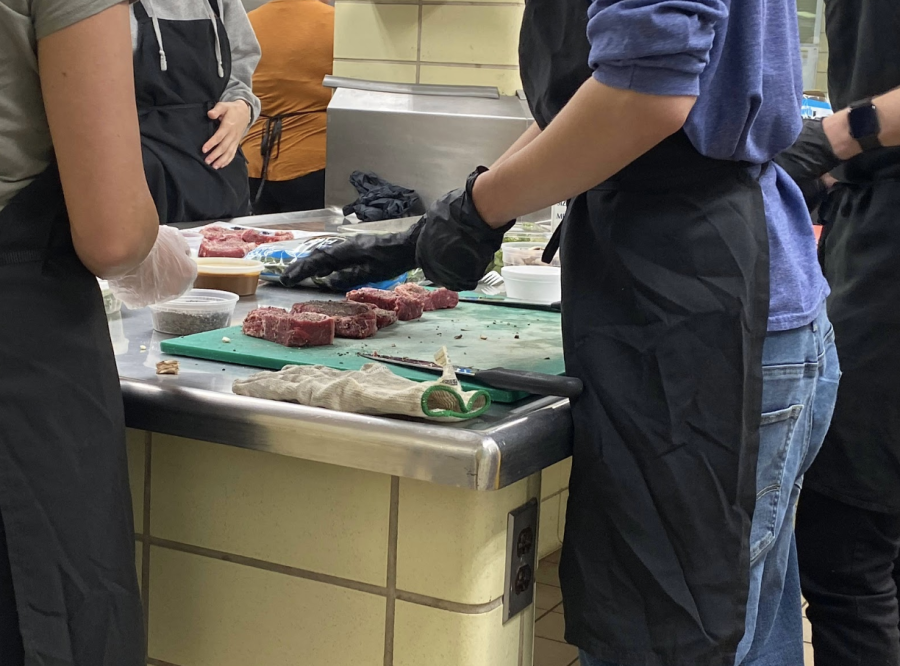Students earn class credit for drinking wine
October 19, 2019
Every Tuesday afternoon, 14 students gather in the kitchen on the second floor of Twin Towers to earn credit by drinking wine.
The kitchen served as the dining hall kitchen for Kent State in the 1960s and has been repurposed to hold culinary courses for the School of Foundations, Leadership and Administration.
One of these classes is Food, Wine and Beverage Pairing taught by Anthony Hamilton, chef instructor in hospitality management. The class has been gaining students since its start in 2006.
The course has become so popular, a new section had to be added, Hamilton said.
“I think the reason the popularity of the class is growing is because students get to drink during class, let’s not kid ourselves,” Hamilton said. “But it is becoming more important to have knowledge because wine is becoming such a social norm.”
Students who take the class are graded based on the completion of projects and participation.
“I can’t tell them what they’re smelling or tasting, so I can’t grade them on what they tasted or what they smelled,” Hamilton said.
While the class is not a requirement for any major and has no prerequisites, it continues to have a waitlist, Hamilton said.
“I just want to take the anxiety out of wine. Wine is such an open sea of information,” Hamilton said.
The class begins with a lecture explaining the properties of the wine and the effect on the taste. Students learn about the wines they will be tasting that day and taste each one, logging their thoughts in a journal.
“It’s really cool to see how the food and wine blend together,” said Maria Santel, a junior hospitality management major.
Each week students try a different pairing, including steak and red wines and seafood and white wines. Three wines are selected by Hamilton each week, and he decides what the class will prepare to taste with the wines.
After the lecture, students move into the kitchen where they gather into groups of three, dividing up tasks to avoid overcrowding.
Students gather around one large counter space to prepare the ingredients and move to the necessary areas to prepare the meal.
“It’s really experimental … I set out a bunch of wines in front of them, and I set up experiments,” Hamilton said.
After students prepare the dish, they taste each component of the dish with the wine and take notes.
The course was first offered to students by Edward Hoegler because it added value to the hospitality management program.
“It’s not necessarily a hard life skill, a social skill is what I’d call it more,” Hamilton said. “I encourage the students to think about what they’re consuming to maximize enjoyment.”
The course was passed down to Hamilton after Hoeglers’ retirement.
About 75 percent of Hamilton’s students are hospitality management majors who have gone through required introductory cooking classes, he said. But he does have students from other majors who may not know much about cooking.
“I took this class because I needed an upper-level elective, but as a finance major, it’s going to help when I have to do business dinners,” said Tommaso Di Lullo, a junior finance major.
Discussing business over a meal can increase the overall profit of a deal by 12 percent, according to a study by Lakshmi Balachandra.
The way the class is taught varies each semester based on the types of students who take the class.
“The second time I taught this class, my class was filled with pre-med majors,” Hamilton said.
Two pre-med students had signed up for Hamilton’s class because they had gone out to dinner with a few doctors. The students didn’t know what the doctors were talking about when it came to wine pairings, he said.
Students will prepare the same dish two ways, taste it with the chosen wines and journal on how the dish affects the taste of the wine.
“It’s really fun to be able to learn more about wine while getting real world experience,” Santel said.
In the hospitality industry, professionals must have a well-rounded knowledge of every aspect of the industry, Santel said.
“It’s so nice to actually want to go to class because you think it’s fun,” said Julia Keenan, senior hospitality management major.
While students are taking classes required for them to graduate, taking classes they think are fun can help keep them sane, Keenan said.
“I think it’s a viable life skill because food and drink are at the center of our culture kind of happenings,” Hamilton said. “I think the more they understand about wine and the more experience they have tasting it, the more they are able to enjoy it and able to share it.”
Contact Katie Thompson at [email protected].












